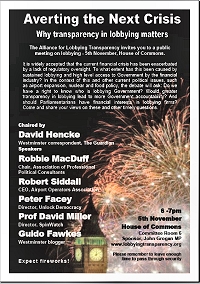for diverse, democratic and accountable media
Blown to bits in Westminster
events |Posted by Nicholas Jones
Self regulation for political lobbying is currently the only show in town but the demand that lobbyists should be allowed to continue policing themselves was blown to bits at a Guy Fawkes’ night debate at the Houses of Parliament.

Robbie MacDuff, chair of the Association of Professional Political Consultants, was assailed from all sides when he insisted that the “self-regulatory system works well and is seen to be working well”.
The furthest MacDuff went to acknowledge the widespread disquiet was to promise that the APPC would keep its voluntary code of conduct under review and strengthen it if necessary.
Lining up against the lobbyists at a debate organised by the Alliance for Lobbying Transparency (5.11.2008) were a trio of campaigners calling for greater openness on the part of the commercial lobbyists who work behind the scenes at Westminster.
Peter Facey, director of Unlock Democracy, said that not only lobbying companies but also pressure groups, charities, trade unions and every other organisation which tried to lobby politicians and influence the passage of legislation should be required to declare their sources of income.
David Miller, director of Spinwatch, claimed the declining trust in the political process was due in part to the suspicion that big business had too much influence on the government of the day. Lobbyists in the USA and Canada were required to declare their fees; a voluntary register had been introduced by the European Union and lobbyists were declaring their fees. Lobbying needed to be regulated at Westminster because not all lobbyists signed up the APPC’s voluntary code of conduct and it failed to monitor law firms, public relations consultancies, banks and accountants.
Paul Staines, better known as the Westminster blogger Guido Fawkes, had kept his powder dry until the last moment: the APPC was nothing more than “a fig leaf” for the lobbying industry. The Association had failed to discipline a single member company since 1994 and he told MacDuff the lobbyists would “bring down regulation on your own heads”. The APPC was less effective than the equally discredited Press Complaints Commission because it did not even cover the whole of the lobbying industry.
When it came to the steps that needed to be taken Peter Facey said the first step should be the introduction of a House of Commons register requiring the identification of all organisations seeking to lobby Mps and peers. Political parties were now required to declare donations of £5,000 and there should be a similar requirement placed on charities, pressure groups etc which accepted money for lobbying.
Douglas Carswell, the only MP to speak (Conservative, Harwich), said he agreed that the House of Commons should put its own house in order. The parliamentary system had to be reformed so that it was clear which Mps were being influenced by lobbyists. For example the defence contractors had established front organisations which lobbied the political parties but they were not covered by self regulation.
MacDuff insisted that the eighty five per cent of lobbyists who were in the APPC were transparent: they registered all their clients on a quarterly basis and had no financial relationships with Mps or peers whereas charities and other organisations had access to Westminster and did not declare their sources of finance.
He tried to counter the criticism by arguing that the APPC’s disciplinary procedures were “pretty rigorous” but they would continue to review them. “If you work as a private sector lobbyist your reputation is shot to pieces when you are exposed in the media for inappropriate behaviour and you lose clients… We try to promote the validity of lobbying which were think is legal”.
MacDuff had effectively thrown down the gauntlet: while awaiting a report from the House of Commons Public Administration Committee into alleged abuses by the lobbying industry, the only course of action left open to campaigners for greater transparency was to accept his advice and help the news media to do more to expose the “inappropriate behaviour” of lobbyists.
DATELINE: 25 January, 2010
Share
